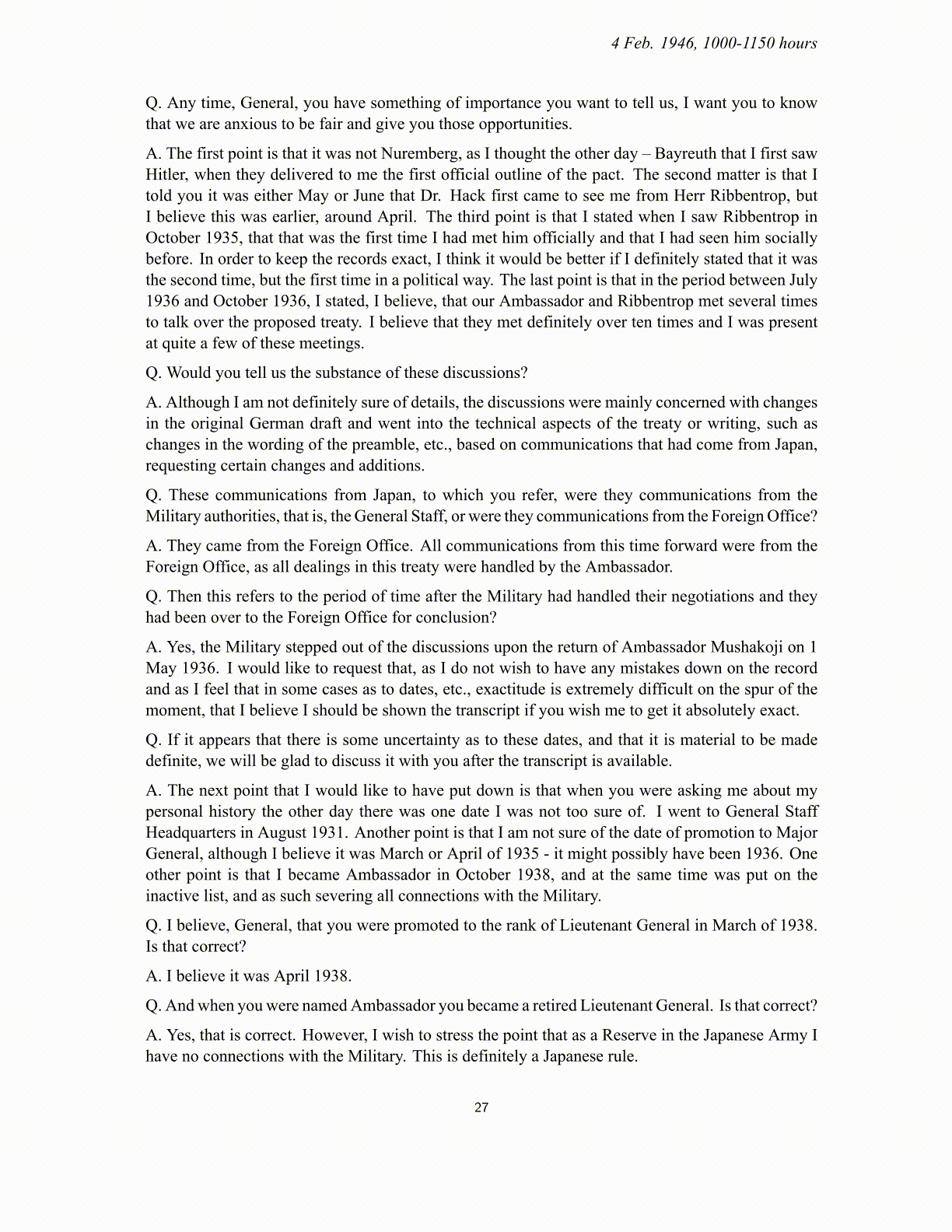
4 Feb. 1946, 1000-1150 hours Q. Any time, General, you have something of importance you want to tell us, I want you to know that we are anxious to be fair and give you those opportunities. A. The first point is that it was not Nuremberg, as I thought the other day – Bayreuth that I first saw Hitler, when they delivered to me the first official outline of the pact. The second matter is that I told you it was either May or June that Dr. Hack first came to see me from Herr Ribbentrop, but I believe this was earlier, around April. The third point is that I stated when I saw Ribbentrop in October 1935, that that was the first time I had met him officially and that I had seen him socially before. In order to keep the records exact, I think it would be better if I definitely stated that it was the second time, but the first time in a political way. The last point is that in the period between July 1936 and October 1936, I stated, I believe, that our Ambassador and Ribbentrop met several times to talk over the proposed treaty. I believe that they met definitely over ten times and I was present at quite a few of these meetings. Q. Would you tell us the substance of these discussions? A. Although I am not definitely sure of details, the discussions were mainly concerned with changes in the original German draft and went into the technical aspects of the treaty or writing, such as changes in the wording of the preamble, etc., based on communications that had come from Japan, requesting certain changes and additions. Q. These communications from Japan, to which you refer, were they communications from the Military authorities, that is, the General Staff, or were they communications from the Foreign Office? A. They came from the Foreign Office. All communications from this time forward were from the Foreign Office, as all dealings in this treaty were handled by the Ambassador. Q. Then this refers to the period of time after the Military had handled their negotiations and they had been over to the Foreign Office for conclusion? A. Yes, the Military stepped out of the discussions upon the return of Ambassador Mushakoji on 1 May 1936. I would like to request that, as I do not wish to have any mistakes down on the record and as I feel that in some cases as to dates, etc., exactitude is extremely difficult on the spur of the moment, that I believe I should be shown the transcript if you wish me to get it absolutely exact. Q. If it appears that there is some uncertainty as to these dates, and that it is material to be made definite, we will be glad to discuss it with you after the transcript is available. A. The next point that I would like to have put down is that when you were asking me about my personal history the other day there was one date I was not too sure of. I went to General Staff Headquarters in August 1931. Another point is that I am not sure of the date of promotion to Major General, although I believe it was March or April of 1935 - it might possibly have been 1936. One other point is that I became Ambassador in October 1938, and at the same time was put on the inactive list, and as such severing all connections with the Military. Q. I believe, General, that you were promoted to the rank of Lieutenant General in March of 1938. Is that correct? A. I believe it was April 1938. Q. And when you were named Ambassador you became a retired Lieutenant General. Is that correct? A. Yes, that is correct. However, I wish to stress the point that as a Reserve in the Japanese Army I have no connections with the Military. This is definitely a Japanese rule. 27